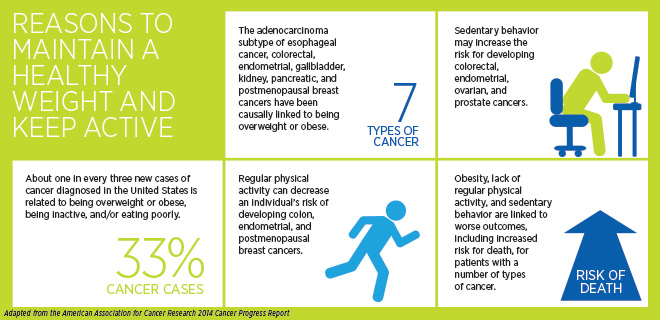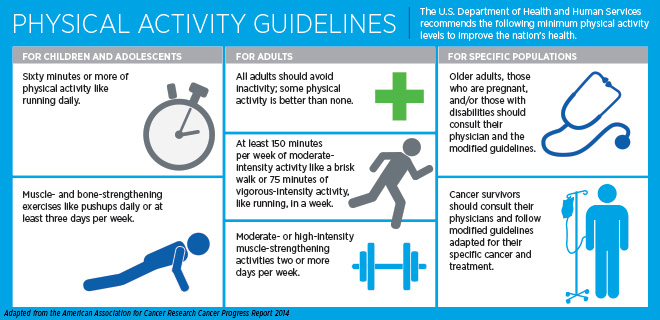Obesity and Your Cancer Risk
Being overweight or obese increases the risk for certain cancers and complications from treatment.
Each of us knows that our weight – particularly being overweight or obese – has an impact on our health and well-being. Obesity increases the risk for heart disease, diabetes, liver disease, and a host of other health conditions.
But did you know that being overweight or obese substantially increases your risk for certain cancers, including postmenopausal breast cancer, colorectal cancer, esophageal cancer, and prostate cancer? In fact, one in three new cancer diagnoses in the U.S. are related to being overweight or obese and the closely related, modifiable lifestyle practices of poor diet and physical inactivity.

Data presented at the Annual AACR International Conference on the Frontiers in Cancer Prevention and Research suggest that obesity in adolescence increases the risk of colorectal cancer later in life. The researchers presented data on nearly 240,000 Swedish 16- to 20-year olds. After an average of 35 years, those participants who were obese in their youth were more than three times as likely to develop colorectal as their normal-weight counterparts.
“Our results suggest that early-life body mass index – may independently play a role in the development of cancer later in life,” said the study’s lead author Elizabeth Kantor, PhD, a postdoctoral research fellow at the Harvard School of Public Health.
In addition to facing an increased risk of developing certain malignancies, obese people diagnosed with cancer often face increased risk of poor treatment outcomes and complications.
Obese patients receiving chemotherapy are more likely to experience blood clots and those undergoing surgery are at greater risk for complications such as infections. Obese breast cancer survivors are at greater risk for lymphedema – painful swelling after surgery. Obese prostate cancer survivors are more likely to experience incontinence, and the problem is often more severe.

Research shows that adopting certain lifestyles, including eating a healthy diet, keeping physically active, and maintaining an appropriate weight, can significantly reduce your risk for cancer (and other serious health problems), treatment complications and cancer recurrences.
One reason obese people with cancer may have lower survival rates compared with normal-weight patients, is that an estimated two in five are underdosed during chemotherapy.
“Underdosing may in part explain why obese patients have a higher risk of recurrence and mortality,” medical oncologist Gary Lyman, MD, MPH, co-director of the Hutchinson Institute for Cancer Outcomes Research at the Fred Hutchison Cancer Center in Seattle, explained in the article “The Weight of Obesity on Cancer Patients” in Cancer Today.
“There are legitimate reasons to cut back on chemotherapy strength, such as heart disease or kidney disease. But obesity is not one of them,” explained Dr. Lyman, a long-time member of the American Association for Cancer Research.
You’ll find much more about the linkage between weight and cancer risk and outcomes in the Fall 2014 issue of Cancer Today. Each issue of the magazine arms readers with reliable information on the latest advances in cancer research; practical advice for living life as a cancer patient or survivor; guidance on being an active partner in one’s treatment; candid stories about patients, survivors, and caregivers dealing with the disease; and thoughtful examinations of efforts to overcome obstacles to quality cancer care.
To subscribe for free or to sign up for its monthly e-newsletter, please visit the Cancer Today site.
